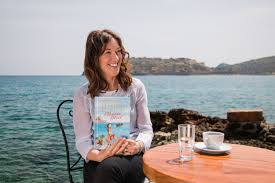Book Review on Victoria Hislop's The Island

Victoria Hislop’s The Island is her debut book, set on a fictional Greek island both pre-war and during the Second World War. The story begins with Alexis Fielding who, at a cross-roads in her own young life, wants to find out about her mother, Sofia’s secret past.
Before heading off to Greece, Sofia gives Alexis a letter addressed to an old friend of hers, Fontina. It is Fontina, the best friend of Alexis’s grandmother, Maria, who is able to provide many of the answers to the questions that Sofia had never been willing to answer.
There follows the telling of Alexis’s family history. Both Alexis’s grandmother and great-grandmother had caught leprosy and had been banished to the island of Spinalonga, a colony where all leprosy sufferers were sent. The novel reveals what life was like both on the colony, and for the family members of those who have been sent. The link between the island and the mainland, is Girogis, Maria’s husband, who took provisions to and from the island.
Victoria Hislop presents Spinalonga as a place of far more hope than the reader might initially expect. The island is a place of love as well as death. Entertainment and industry flourish and people prosper, especially after the arrival of the lepers sent from Athens. Spinalonga is a place that people dread to go to, but once there, don’t necessarily want to leave.
The novel heads toward a conclusion as a cure for leprosy is found and the islanders are free to leave. There is though one more dramatic twist that prevents a ‘happy ever after’ ending. Read more about the novel here.
Book club questions on Victoria Hislop's The Island
- Maria claims that Sofia is like her mother, when she stays out late and is hot-headed. How would you sum up Sofia’s character?
- How do you think the story would have panned out if Andreas hadn’t come to the village celebration?
- Do you think The Island captures the mood of Greece? How would you sum up the atmosphere at different points in the novel?
- In The Island, Spinalonga is arguably seen as a better developed society than the mainland was. Discuss whether you agree with this statement. Give reasons for your opinions.
- When Maria went to Spinalonga, Fontina was able to visit her and drink tea in her house. Maria also saw her father three times a week. How do you think the rest of the islanders would feel about this?
- How would you sum up Giorgis’s character?
- How convincing did you find the characterisation in the novel The Island? Discuss the reasons for you viewpoint.
- Is the book a tragedy? Discuss why or why not.
- After everyone left Spinalonga events moved quickly. A lot happens and a lot of time passes in only a relatively few chapters. Do you think The Island would be a better novel if the story ended at a different point? Discuss the reasons for your viewpoint.
- Why was Sofia so secretive about her life? What made her finally decide it was time for the truth of her past to be shared with Alexis?
- What do you think is the most heroic event or action in The Island? Discuss.
- What did you find the most moving aspect of The Island? Discuss.
- What aspects of The Island didn’t you enjoy?
- On Spinalonga we learn that Elina has an adversary with a grudge against her, that is then transferred to her daughter. However, this isn’t really developed. Are there any other aspects of the story that you’d like to know more details about?
Book club questions on Victoria Hislop's The Island (if you haven't read the book!)
- One August Night is the sequel to The Island. Set in 1957 it follows the next chapter of the Petrakis family, after the island Spinalonga becomes uninhabited. What is your view of sequels? Are they ever as good as the first book in a series?
- Victoria Hislop is a Greek Citizen and owns a home in Crete. She is passionate about using the Greek Islands as a backdrop to her stories. If you were a novelist where would you set your novels and why?
- Victoria Hislop’s book The Island spans several generations. A main theme that runs through it, is exposing family secrets. To what extent do you think families should be open about their histories? What are the advantages and disadvantages of keeping family secrets?
- Anna and Maria in Victoria Hislop’s The Island are, in many ways, polar oppsites of each other. To what extent do you think nurture dominates over nature, or vice versa? Discuss the reasons for your opinions.
- Many of the people on the mainland are prejudiced against people with leprosy. Discuss why you think it carried such a stigma. Can you make any comparisons to prejudices that people hold today?

Personal Response to Victoria Hislop's The Island
I wasn’t sure whether I would enjoy The Island or not. Love affairs, ending in tragedy; boring, but rich husbands; unreliable lovers; wild daughter and loyal daughters – it all seemed a heady romantic mix and family saga, that I wasn’t sure was my cup of tea.
The structure was brave and accessible so that was good. The opening of Alexis travelling, provided a good reason for telling the story of her mother. To my mind, the development of Sofia’s teen years were a little rushed. And, while I didn’t bother to calculate the dates it seemed odd that Fontina was still in such good health, running her cafe, when both Maria and Kyritsis had died.
There were parts of the tale that I ddin’t find completely convincing (spoiler alert), the shooting for example, was a bit too melodramatic for my stiff-upper lip British sensibilities. However, putting crimes of passion aside, I thought it was a good first novel.